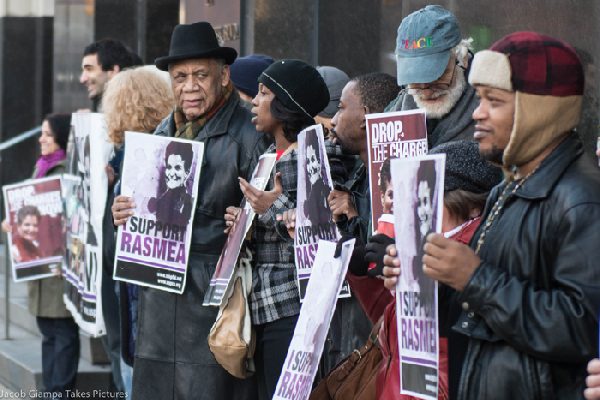
|
| Odeh supporters rally outside the federal courthouse in Detroit. |
DETROIT — Palestinian activist Rasmea Odeh took the stand at her trial on Thursday and testified that she did not lie about arrest and conviction in an Israeli military court in 1969 on her U.S. naturalization application.
Odeh said she thought the questions about whether she has ever been arrested or convicted applied to the United States only. She added that if she had known what the questions meant, she should have disclosed her arrest in Israel, which is “not a secret.”
Odeh, 67, is accused of lying on her U.S. naturalization application about being arrested and convicted in Israel about 45 years ago.
Her supporters describe the indictment as a “political witch-hunt” to deal a blow to Palestinian activism in the United States. They link her arrest in Chicago last year to a federal crackdown on political dissent that started in 2010 after FBI raided the homes of 23 activists, including Hatem Abudayyeh, the executive director of the Arab American Action Network, where Odeh works.
Odeh said the application questions on if she has “EVER” been arrested or convicted were preceded by three questions that asked if she had “EVER” claimed to be a U.S. citizen or participated in any elections here. She added that she was in the mindset that all the questions in that section were related to the United States.
She also testified that the events in Israel were well-known to the community in Chicago and that even the American embassy in Jerusalem knew about them. “How can I hide this thing? I can’t,” she said.
Questioned by lead defense attorney Michael Deutsch, Odeh told her life story and the circumstances of her arrest in 1969. She said the Israeli military swept up 500 people, including her father and sister, at the time she was arrested. Odeh was brought to tears as she recalled that her 23-year-old sister was killed during the process of the arrest.
Odeh says she was tortured and raped by Israeli military officers, who forced a confession out of her about involvement in a bombing that killed two people. However, U.S. District Judge Gershwin A. Drain banned discussing the circumstances of Odeh’s arrest and conviction. In a ruling two weeks ago, he said he does not want to retry the incident in Israel and instead wants the proceedings to focus on her answers on her naturalization application.
Odeh, who was released in a prisoners’ exchange between Israel and the Popular Front for the Liberation of Palestine after spending 10 years in jail, settled in Jordan until her immigration to the United States.
Thursday, she said she was having the best time of her life in Amman, where she had a car, house and two jobs, but she decided to immigrate to America to help take care of her father who was suffering from cancer.
Deutsch tried to get Odeh to talk about the details of her trial in Israel, asking her if she had access to a lawyer, if there was a jury and how she was convicted.
With every question relating to Israel, the prosecutors objected and the judge sustained their objections.
However, Odeh did say that she had no access to a lawyer and that she was convicted falsely.
Odeh’s supporters have demonstrated in front of the courthouse and packed the courtroom during every day of the trial, which started Monday. Live feed of the trial was broadcasted to an overflow room for Odeh’s supporters who could not fit into the courtroom.
Odeh said she wanted to return to Jordan in the early 2000’s after her father and brother’s death, but after realizing that she can help empower Arab American women in Chicago, she decided to stay in the United States and apply for citizenship.
Her supporters in the overflow room erupted in cheers after she said many of the women she worked with in Chicago are here to stand with her. A federal marshal warned the cheering audience that those who raise their voice next time will be expelled from the courthouse.
On Tuesday, the prosecution brought multiple immigration experts, including Douglas Scott Pierce of the U.S. Citizenship and Immigration Service (USCIS). The prosecution’s witnesses testified that Odeh obtained her citizenship illegally because her original immigration application did not disclose her arrest. Pierce said crimes that question the applicant’s moral character usual disqualify potential immigrants from legal entry into the United States.
Federal prosecutor Mark Jebson said in his opening remarks that Odeh should have never been allowed into the United States.
However, Odeh who said she did not know English at the time, testified that her brother filled her application in 1994. The application was not signed by Odeh.
On Thursday, Dr. Nadine Naber, an associate professor in gender and women’s studies at the University of Illinois at Chicago (UIC), testified about Odeh’s role as a respected community organizer in Chicago.
Deutsch told The Arab American News the judge’s decision to exclude evidence about the defendant’s torture “guts the heart of our defense.” He said it is important to show Odeh’s involvement and significance in her community.
Supporters congregated across the street of the federal courthouse on Lafayette and gave a hero’s welcome to Odeh after her testimony, chanting her name and pledging to “wage love for Rasmea.”
The jury is expected to deliberate and reach a verdict on the case Monday. If convicted Odeh faces jail time and deportation.






Leave a Reply